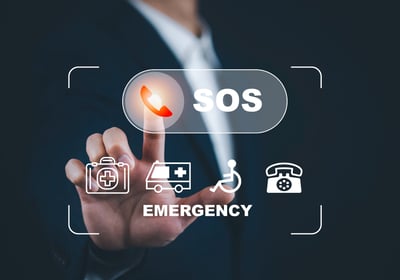Research & Impact
At the Center for Law Enforcement and Emergency Management, we are dedicated to advancing public safety through research, training, and policy development. Our work focuses on equipping law enforcement professionals, emergency responders, and policymakers with the tools and knowledge they need to address today’s most pressing security and crisis management challenges.
Law Enforcement Policy and Public Safety
This research area focuses on improving policing strategies, accountability, and crime prevention while fostering stronger relationships between law enforcement and communities.


Police Ethics and Accountability – Examining ethical considerations, misconduct prevention, and oversight mechanisms.
Artificial Intelligence in Law Enforcement – Evaluating AI-driven tools for predictive policing, surveillance, and risk assessment.
Community Policing and Public Trust – Studying engagement strategies to strengthen relationships between law enforcement and the public.
Crime Prevention Strategies – Researching innovative approaches to reducing violent and organized crime.
Digital Forensics and Cyber Investigations – Enhancing law enforcement capabilities in investigating cybercrimes and digital evidence collection.
Research Areas of Focus
Emergency Management and Disaster Response
This area explores best practices for disaster preparedness, response coordination, and recovery efforts to mitigate risks associated with natural and human-made crises.


Crisis Coordination and Incident Management – Developing frameworks for effective interagency collaboration during disasters.
Climate Resilience and Disaster Adaptation – Investigating strategies to improve community preparedness for climate-related emergencies.
First Responder Health and Safety – Identifying best practices to protect emergency personnel during high-risk operations.
Search and Rescue Operations – Enhancing training and resource allocation for urban and wilderness search and rescue efforts.
Mass Casualty and Evacuation Planning – Strengthening policies and logistical strategies for large-scale emergency responses.
Fire Management and Investigation
This area focuses on fire prevention, investigation, and forensic techniques to improve safety and response effectiveness.


Fire Investigation and Forensic Techniques – Advancing methodologies for determining fire origins and causes.
Arson Detection and Prevention – Developing strategies to identify and prosecute intentional fires.
Fire Risk Assessment and Mitigation – Evaluating urban and industrial fire hazards and prevention measures.
Wildland and Urban Interface Fire Management – Addressing the challenges of fire suppression and land use planning.
Firefighter Safety and Occupational Hazards – Enhancing protective measures for fire service personnel.
Maritime Security and Safety
This research area addresses security challenges in maritime environments, ensuring the safety of ports, vessels, and international trade routes.


Maritime Security and Law Enforcement – Strengthening efforts to combat piracy, smuggling, and maritime trafficking.
International Maritime Policy and Safety Management – Examining regulations that enhance maritime safety and security.
Port Security and Trade Route Protection – Assessing risks and policy solutions for securing global shipping networks.
Maritime Terrorism and Threat Prevention – Investigating vulnerabilities and countermeasures against maritime-based terrorism.
Illegal, Unreported, and Unregulated (IUU) Fishing – Addressing security threats linked to maritime resource exploitation.
Cybersecurity and Digital Threat Mitigation
With increasing digital threats, this area focuses on law enforcement cybersecurity, cybercrime prevention, and digital forensics.


Cybercrime Investigation and Law Enforcement – Enhancing capabilities to combat hacking, fraud, and cyber threats.
Critical Infrastructure Cybersecurity – Securing public safety networks from cyberattacks.
Digital Evidence and Cyber Forensic Methods – Improving techniques for analyzing cyber-related criminal activities.
AI and Machine Learning in Cybersecurity – Evaluating the role of emerging technology in preventing cyber threats.
Cyber Resilience for Emergency Services – Ensuring continuity of operations in the face of digital disruptions.
Counterterrorism and Homeland Security
This area focuses on national and international security efforts to counter terrorism, prevent violent extremism, and enhance intelligence coordination.


Terrorism Threat Assessment and Prevention – Identifying evolving threats and response strategies.
Border Security and Cross-Border Law Enforcement – Strengthening policies to prevent transnational crimes.
Intelligence Sharing and Coordination – Improving collaboration among security agencies.
Public Event Security and Crowd Management – Researching strategies to protect high-risk public gatherings.
Threats to Critical Infrastructure – Studying emerging risks to power grids, transportation hubs, and public utilities.
International Law Enforcement Cooperation and Policy
This research area explores collaborative efforts between law enforcement agencies across borders to address global security challenges.


Interpol and Global Crime Prevention Initiatives – Studying international policing frameworks.
Extradition Laws and Transnational Crime – Examining legal frameworks for international law enforcement cooperation.
Drug Trafficking and Organized Crime Networks – Investigating global efforts to combat illicit trade.
Human Trafficking and Modern Slavery – Strengthening international responses to trafficking networks.
International Legal Frameworks for Law Enforcement – Assessing the impact of treaties and agreements on global policing.
Our Public Safety Insights
Our research generates valuable insights that shape public safety policies and practices. Through data-driven analysis and real-world case studies, CLEEM provides actionable recommendations for law enforcement agencies, emergency responders, and policymakers.
Data-Driven Policing Enhances Crime Prevention
Predictive analytics and AI-driven tools help law enforcement allocate resources effectively, leading to reduced crime rates and improved public safety outcomes.


Community Engagement Strengthens Public Trust
Law enforcement agencies that prioritize transparency and collaboration with communities see better cooperation, lower crime rates, and enhanced public confidence.
Strong partnerships between law enforcement, emergency responders, and government agencies are critical for rapid and effective disaster response and crisis management.
Effective Crisis Response Requires Multi-Agency Coordination




Cybersecurity is a Growing Concern for Public Safety Agencies
With rising cyber threats, law enforcement and emergency management agencies must adopt robust cybersecurity measures to protect sensitive data and critical infrastructure.


Mental Health Training Reduces Use-of-Force Incidents
Specialized training in crisis intervention and de-escalation techniques equips officers with the skills needed to handle mental health crises safely, leading to better outcomes for individuals in distress.
Protecting ports, coastal regions, and maritime trade routes from security threats such as smuggling, piracy, and terrorism is essential for economic stability and national security.
Maritime Security is Crucial for Global Trade and National Safety




Border Security Requires a Balance Between Enforcement and Human Rights
Innovative technologies and policy reforms can enhance border security while ensuring fair and humane treatment of migrants and asylum seekers.


AI and Technology in Law Enforcement Must Be Used Ethically
The integration of artificial intelligence and surveillance tools in policing must be guided by ethical frameworks to prevent bias, protect civil liberties, and maintain public trust.
Communities with proactive disaster preparedness programs experience fewer casualties, faster recovery times, and reduced economic impact during emergencies.
Disaster Preparedness Saves Lives and Resources




Training and Professional Development Improve Public Safety Outcomes
Ongoing education and specialized training for law enforcement and emergency personnel lead to better decision-making, reduced errors, and improved community relations


Public-Private Partnerships Enhance Emergency Response
Collaboration between law enforcement, emergency agencies, and private sector organizations improves resource sharing, disaster response efficiency, and overall public safety resilience.
During emergencies, law enforcement and emergency management agencies can use social media to provide real-time updates, counter misinformation, and engage directly with the public for faster response coordination.
Social Media is a Vital Tool for Crisis Communication




Resource Library
CLEEM’s Resource Library provides access to research papers, policy briefs, training materials, and case studies on law enforcement, emergency management, and public safety. Our resources support evidence-based decision-making and best practices for professionals and policymakers.
Featured Reports & Publications
Enhancing Law Enforcement Accountability: Best Practices and Policy Recommendations
An in-depth analysis of transparency measures, oversight mechanisms, and policy improvements to strengthen public trust in law enforcement.
Crisis Response and Disaster Preparedness: Lessons from Recent Emergencies
A research-driven guide to improving coordination, communication, and effectiveness in emergency response operations.
The Role of Artificial Intelligence in Modern Policing
Exploring the benefits and ethical concerns of AI-powered tools in law enforcement, including predictive analytics, surveillance, and risk assessment technologies.
Community-Driven Policing: Strategies for Building Public Trust
A comprehensive study on the impact of community engagement initiatives, highlighting successful programs and key takeaways for law enforcement agencies.
Cybersecurity in Public Safety: Protecting Law Enforcement Agencies from Digital Threats
An overview of the evolving cybersecurity challenges facing law enforcement and best practices for protecting critical data and infrastructure.
Training & Educational Resources
Crisis Intervention and De-escalation Training for Law Enforcement
A training module designed to equip officers with the skills necessary to effectively manage mental health crises and reduce the risk of escalation.
Disaster Management and Emergency Response Planning
A comprehensive guide for first responders and emergency planners on disaster preparedness, response coordination, and recovery efforts.
Ethical Considerations in Law Enforcement: A Practical Guide
An interactive resource focusing on ethical decision-making, accountability, and professional conduct in law enforcement.
Cybercrime and Digital Forensics: Law Enforcement Strategies
A resource for investigators and officers to understand cyber threats, digital evidence collection, and cybersecurity protocols.
Leadership Development in Public Safety Agencies
A specialized training resource designed to support leadership growth, decision-making, and crisis management in law enforcement and emergency management roles.
Securing Global Waters: Advancing Maritime Security Strategies
A report examining the critical maritime security challenges and presents strategic recommendations for enhancing safety and enforcement at sea.
Advancing Fire Safety and Risk Mitigation Strategies
An in-depth analysis of modern fire prevention, investigation, and response strategies to enhance public safety and reduce fire-related risks.
Fire Safety and Investigation Training: A Comprehensive Guide for First Responders
An in-depth training guide designed to equip firefighters, investigators, and emergency personnel with the knowledge and skills needed for fire prevention, investigation, and response.
Center for Law Enforcement and Emergency Management
Main Office: 1000 G Street, #290, Sacramento, CA 95814
join our email list
info@cleem.org
916-866-5524
© 2025. All rights reserved.
Los Angeles Office: 777 S. Alameda, 2nd fl, Los Angeles, CA 90021
213-260-1732
Atlanta Office: 1055 Howell Mill Rd, 8th fl, Atlanta, GA 30318
470-804-0198
Orlando Office: 111 North Orange Avenue, Suite 800, Orlando, FL 32801
407-358-0780
